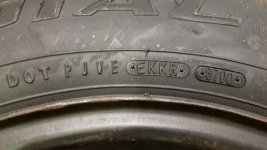-
Got the Contributing Memberships stuff finally worked out and made up a thread as a sort of "How-To" to help people figure out how to participate. So if you need help figuring it out, here's the thread you need to take a look at -> http://www.corvetteflorida.com/forums/showthread.php?t=3581 Thank you, everyone! Rich Z.
You are using an out of date browser. It may not display this or other websites correctly.
You should upgrade or use an alternative browser.
You should upgrade or use an alternative browser.
Tire Date Code
- Thread starter Cor66Vette
- Start date
Cor66Vette
New member
Dang! And that darn thing was in the spare tire tub of my '75. :ack2:
Cor66Vette
New member
I have a Pirelli in my shed that is from 2005 and has never seen sunshine. It looks new and still has the sticker on it. I think you have to look at all contributing factors in determining whether a tire is serviceable or not, not strictly by age.
Wrong.
Wrong.
I've read all kinds of opinions about the topic of tire age being a factor concerning failures. Not sure what the figure might be for a shelf life, but I know I've seen my share of dry rotter rubber to know that it certainly isn't likely to be infinite. I might very well be that some compounds used in tires by different manufacturers just might be better concerning longevity than others.
I think I would inspect my tires regularly, and once I start seeing signs of small cracks anywhere on the tire, it's time for them to be replaced, no matter how much mileage they've had and remaining tread.
When I had my blue C5Z in the local chop shops being butchered, the guy up in Thomasville said the rear tires had aged to where they had hardened enough to lose most of their grip on the dyno drum. My guess would be that hardening would precede or coincide with the aged rubber cracking.
I remember being down at my mom's (before she passed away) and she was considering getting rid of her Thunderbird. She had had it for a while, and was starting to have reliability problems. She was also concerned about the age of the tires, as some tech had told her they needed to be replaced. I looked over her car for her, and superficially the tires looked fine. But when I took a small flashlight and shone the light at an angle to the surface, I could see a lot of micro cracks all in the rubber. So she traded in the car when I told her that yes, she did need new tires.
Cor66Vette
New member
Flat spots certainly make for a less than pleasant driving experience, and probably not the safest tires to use, but dried out, old tires are another thing- they're plain and simple dangerous. When tires get old, the chemicals in the rubber that allows for resilience and flexibility wear out. Old tires also lose their road-gripping potential. Of course sun, heat and other elements hasten the degenerative process, but time is the main reason why old tires become ticking time bombs.
If someone feels comfortable using that "new-looking" tire in the shed, then go for it.
Cheers, gentlemen.
If someone feels comfortable using that "new-looking" tire in the shed, then go for it.
Cheers, gentlemen.
To some degree I agree .But ,who am II have a Pirelli in my shed that is from 2005 and has never seen sunshine. It looks new and still has the sticker on it. I think you have to look at all contributing factors in determining whether a tire is serviceable or not, not strictly by age.

